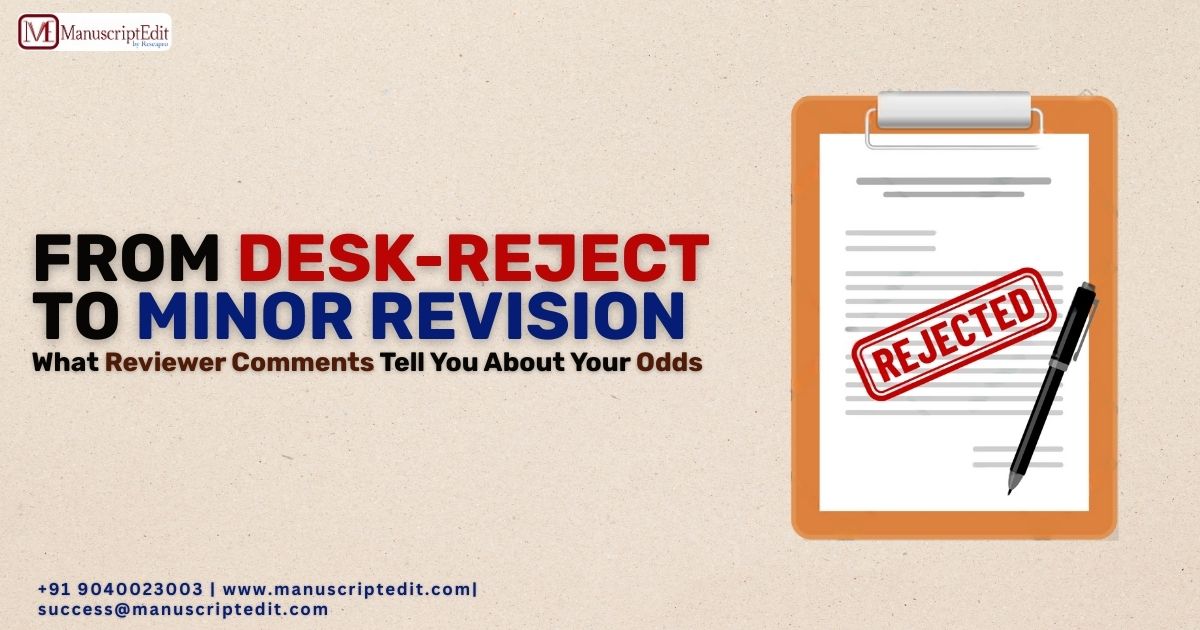
Did you know that 60–70% of research articles are rejected on initial journal submission? A large portion of these fall under desk reject—where the manuscript is declined by the editor without being sent for peer review. Most of these rejections don’t occur due to poor research but because authors fail to manage reviewer comments effectively or miss early submission requirements. Understanding how to respond to reviewer comments correctly can turn a rejection into a revision—and a revision into a publication. This blog explores what reviewer feedback really means, how to read between the lines, and what your chances are based on different types of responses.
What Is a Desk-Reject (and How to Avoid It)?
A desk reject occurs when a journal editor rejects your manuscript without being forwarded to peer reviewers. This type of rejection is often done within a few days and may be disheartening. It is, however, usually avoidable.
These are the most frequent desk rejection causes:
Out of Scope: The subject of your paper does not align with the focus or themes of the journal.
Poor Structure: If your manuscript is poorly written, is incomplete with aspects such as abstract or references, or has no proper structure.
Weak Science: If the study is not original, employs outdated techniques, or fails to present new knowledge.
To prevent desk rejection, always read the “Aims and Scope” section of the journal most carefully. Also, see whether your work suits the type of studies they publish. Organize your paper per their instructions and ensure your content is scientifically valid.
Understanding Major vs Minor Revisions
If your paper is not rejected outright, it will be peer-reviewed. Then, you will receive comments from reviewers. This typically takes the form of one of two things — major revision or minor revision.
Major Revision
This indicates that your paper shows promise but requires significant improvement. You may need to revise major portions, insert new information, or correct methodology issues. While it sounds ominous, a substantial revision is nonetheless an opportunity for publication.
Minor Revision
This indicates your paper is nearly publishable. You might only need to proofread for grammar, refresh a few references, or tighten some areas.
- Major vs Minor Revision impacts your acceptance rate.
- Major revisions generally take longer, whereas minor revisions may result in prompt acceptance.
- Your reaction to reviewers has a significant impact in both instances.
Surviving a Major Revision: What the Data Says
If your article is given a major revision, it indicates that the reviewers appreciated your work but would like significant changes before it is publishable. Although it might appear a step backward, it is a better outcome than rejection.
There is one question that many researchers have: How can major revisions survive?
Here is an example:
A journal for environmental economics accepted a paper that was submitted to them. The authors received a major revision on the paper. They rewrote the whole literature set, added two additional datasets, and clarified their methodology. They even addressed each reviewer’s comment with care. The outcome? The paper was accepted within 45 days after resubmission.
This indicates that a proper response can make a significant revision successful. Rather than dwell on the negative comments, try to see the reviewer’s comments as a chance to improve your paper.
Need Help Responding to Comments?
Most authors are unsure how to write a polite and clear response to reviewers. If you’re uncertain, ManuscriptEdit’s Response to Reviewer service can assist you in responding to feedback well and increasing your chances of acceptance.
Minor Revisions: Your Key to Acceptance
When your paper is returned with a minor revision, you are nearly there, with acceptance within sight. These changes are usually small and focus more on clarity, structure, or formatting than the actual research.
Minor revision requests that are common include:
- Correcting typos or grammatical errors
- Clarifying language
- Replacing or adding citations
- Adjusting the formatting according to the journal style
Based on peer review success rates data, manuscripts needing minor revisions are accepted more and faster than those needing major revisions.
How to Convert Critical Remarks into a Successful Response
And then comes the most crucial part — a response to reviewer remarks. It is not only about corrections but also about the way you talk to reviewers and editors.
Here’s a quick action checklist to write an effective response:
- Be Courteous and Grateful
Thank the reviewers for their remarks, no matter how critical they were.
- Reply to Every Remark Independently
Use a point-by-point style. Quote each comment and respond just below.
- Provide Clear Justification
If you altered something, say what and why. If you didn’t alter something, provide a sound reason supported by references or facts.
- Maintain Professional Tone
Don’t sound defensive. Be calm and polite, even when you disagree.
- Be Thorough
Don’t leave out any comments, even minor ones. Editors want to know you took each suggestion seriously.
Your objective is to demonstrate to reviewers that you are receptive to revision and dedicated to rigorous research standards. A good response can be the difference between a second round of review and eventual acceptance.
Conclusion
In scholarly publishing, reviewer feedback is not merely criticism but a guide to publication. Whether you’ve received a desk reject or been asked to make a major or minor revision, how you respond plays a crucial role in determining the future of your paper.
Addressing reviewer comments clearly, respectfully, and thoughtfully demonstrates to editors that you appreciate the peer review process and are open to improvement. Most importantly, it increases your likelihood of being published.
Don’t let frustration or confusion hold you back. Clarify what reviewers are saying and respond confidently and clearly.
Maximize your chances. Let ManuscriptEdit’s experts write your winning response today → Start Now.



